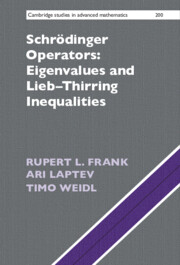4 - The Schrödinger Operator
from Part Two - The Laplace and Schrödinger Operators
Published online by Cambridge University Press: 03 November 2022
Summary
We discuss the definition of the Schrödinger operator on Euclidean space as a self-adjoint operator and discuss basic properties of its spectrum, including criteria for discreteness and finiteness of its negative spectrum. We analyze in detail the classical examples of the harmonic oscillator, the Coulomb Hamiltonian and the Pöschl–Teller potential, which can be solved using a commutation method. Returning to general potentials, we use Dirichlet–Neumann bracketing to prove Weyl asymptotics for the number and Riesz means of negative eigenvalues in the strong coupling constant limit. These asymptotic results are complemented by the nonasymptotic results of Lieb–Thirring, Cwikel–Lieb–Rozenblum, and Weidl. We present a unified method of proof of these bounds, based on Sobolev inequalities and the Besicovitch covering lemma. As an application of these bounds, we extend Weyl asymptotics to a large class of potentials.
Keywords
- Type
- Chapter
- Information
- Publisher: Cambridge University PressPrint publication year: 2022

